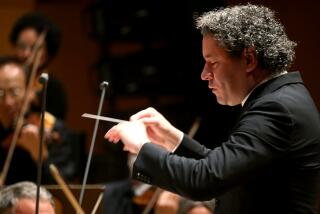Beethoven, Beyond the Fifth
- Share via
Just when you thought you’d heard it all, and the future of recorded classical music would hold only the 70th version of Vivaldi’s “Four Seasons” or such dubious surprises as the complete works of Ditters von Dittersdorf, along comes a major recording company, Deutsche Grammophon, unearthing forgotten music by the titan himself, Beethoven, and placing it in the hands of its top performing guns, Claudio Abbado and the Berlin Philharmonic.
Not that all of the work in question, “The Consecration of the House,” is completely unknown. The maniacally insistent (on the key of C major) overture from the incidental music to the play of that name, written in 1822 to inaugurate a new theater in Vienna, has become associated with similar occasions in modern times. And a couple of its other numbers were recycled by Beethoven from an earlier, marginally more familiar composition, the hilarious mock-Turkish “Ruins of Athens.” The 50-minute “Consecration” score is less great art than great, sloppy fun (Deutsche Grammophon 447 748).
While Abbado’s reading of the overture, gorgeously executed by the Berliners, is too tastefully restrained--it sounds bigger and better in the hellaciously energetic performance (on Sony) by Leonard Bernstein and the New York Philharmonic, recorded at the opening of Lincoln Center in 1962--the totality of Abbado’s accomplishment is impressive.
Aside from the orchestra, one of the abiding miracles of today’s musical life, Abbado is blessed by the presence of the Berlin Radio Choir and a couple of the shining lights of the current vocal scene, soprano Sylvia McNair and baritone Bryn Terfel.
As an encore, Abbado and Co. offer an even more obscure score, the music Beethoven provided for another forgotten play, “Leonore Prohaska.” It includes a beefy male chorus made to order for a Gilbert and Sullivan sendup, a soprano aria of exquisite dopiness (to which McNair nonetheless gives her all) and a poetic recitation accompanied by the extraterrestrial sounds of the glass harmonica, a set of tuned, water-filled glass bowls--an instrument invented by Ben Franklin that was all the rage in early 19th century Vienna.
More frequently encountered but still hardly core Beethoven is the oratorio “Christ on the Mount of Olives.” “Mount of Olives” has suffered from the bad press it was given by the composer himself, never generous to the hack poets he was compelled to set. But our own ears should guide us, and in as dedicated and accomplished a presentation as given by conductor Helmut Koch and the forces of Radio Berlin, the work has a strong dramatic effect. This remastered 1970 recording is the centerpiece of a mid-priced set devoted to rare works from each stage of Beethoven’s career (Berlin Classics 91322, three CDs).
Like Abbado, Koch has a superb chorus and strong soloists at his disposal, including Hungarian tenor Jozsef Reti, whose elegant vocalism and keen verbal projection convincingly communicate the agonies of Christ, despite the text’s platitudes.
This handy collection--not all of it, however, well served by its executants--also includes the youthful “Knightly Ballet” music; an even earlier and almost ludicrously conventional Piano Concerto in E flat, affectionately played by Peter Gulke; and choruses, dance music, vocal canons and a selection of Beethoven’s potboiling arrangements of Irish songs, delivered in fractured English by singers who seem as clueless about the import of the texts as the composer himself confessed to be.
Also from Berlin Classics (91602, mid-price) is a far better known but still more often discussed than performed work, the monumental “Missa Solemnis,” in a grandly dramatic interpretation from Kurt Masur, who leads the Leipzig Gewandhaus Orchestra, a vocal quartet headed by tenor Peter Schreier and, most remarkably, the Radio Leipzig Chorus, singing like a band of inspired warrior angels.
More to Read
The biggest entertainment stories
Get our big stories about Hollywood, film, television, music, arts, culture and more right in your inbox as soon as they publish.
You may occasionally receive promotional content from the Los Angeles Times.










